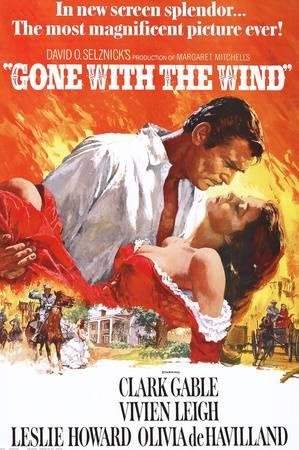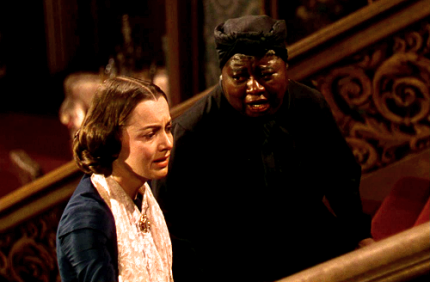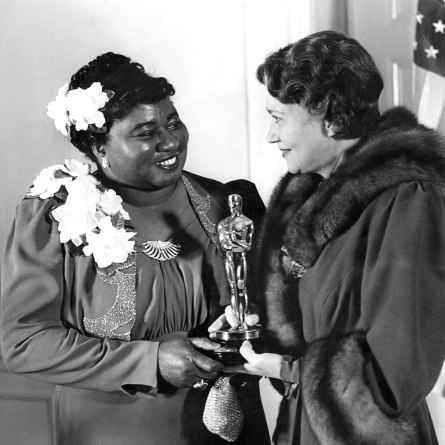Hattie McDaniel, born on the 10th of June 1893, is one of the most famous black performers to ever live. She was born in Wichita to former slaves, Susan and Henry McDaniel, and was the youngest of their thirteen children. She began songwriting, and performing in her brother’s minstrel show when she was a teenager, and began a radio career in her early thirties. During this time she recorded sixteen blue sides, but upon the onset of the Great Depression, she was unable to find work outside of being a washroom attendant and waitress in Milwaukee. She would eventually be allowed to perform at the club where she worked, before moving to Los Angeles to be with her brother and sister.

When she could not find work in films, Hattie had to work as a domestic servant or cook. Even when she gained popularity on radio programme, The Optimistic Do-Nut Hour, as the sassy maid, Hi-Hi-Hattie, she still had to work as a domestic servant in real life due to a pitiful salary.
Her first film appearances were as maids in The Golden West and I’m No Angel, both made and released in 1932. After joining the Screen Actors Guild in 1934, she was given larger roles and gained more recognition. She would continue to play maids in Alice Adams, China Seas and Murder by Television. But her roles would be memorable, and her performance in Alice Adams caused an uproar with white Southerners when she overshadowed Katherine Hepburn in several scenes. She would also play a main role in the 1936 version of Showboat in which she sang “Can’t Help Lovin’ Dat Man” with Irene Dunne, Helen Morgan, Paul Robeson and a supporting black choir. She would continue to have success in films opposite Jean Harlow, Clark Gable, Margaret Sullavan, Henry Fonda and Barbara Stanwyck. During this time she would also become friends with major Hollywood stars such as Joan Crawford, Clark Gable, Tallulah Bankhead, Bette Davis and Olivia de Havilland.

And then Gone With the Wind came along. The competition for the role of Mammy was as heated as that of Scarlett O’ Hara, with Eleanor Roosevelt even writing to David O’ Selznick in a bid to get him to cast her own maid, Elizabeth McDuffie. Hattie did not feel confident about her chances, despite Clark Gable supposedly suggesting her for the role. But when she attended her audition in an authentic maid’s uniform, and no doubt gave a stellar performance, she was given the role that would she become most famous for.

Stealing the show
Hattie McDaniel’s performance as Mammy was the first time I ever saw a black woman be strong and opinionated in a movie. I watched Gone with the Wind for the first time as a young child, and while I was mesmerised by Scarlett, I was equally as absorbed by Mammy. While Mammy had been a slave, and would then become a domestic servant after the Civil War, and had therefore received no formal education; she was bright and witty and most of all, very insightful.

She functions almost as a Greek chorus, commenting on the larger events of the film, but especially on Scarlett’s often ill conceived and selfish behaviour. She, and Rhett, are really the only characters to see through Scarlett’s outward act, and not be dazzled by her beauty. Although, of course, Mammy proves to be less susceptible to the latter than Rhett. And while Mrs O’ Hara is a good and caring mother to her children, it is Mammy who provides Scarlett with comfort and tenderness as she grows into a woman. Mammy is present for all the difficult and terrible trials of Scarlett’s life, such as helping to birth Melly’s baby, keeping Scarlett and Melly calm during the trek from Atlanta to Tara, providing Scarlett with household and emotional support during the awful poverty that follows, and trying to comfort her during her miscarriage and the death of Bonnie.
But Mammy is her own character, too. There has been criticism levelled at the fact that Mammy’s own family is never shown, and this is heartbreaking for its probably unintentional commentary on how slavery separated black families. However, not for one moment does Mammy appear one dimensional. She is a woman who suffers and sacrifices just as much as her white counterparts, and it is Hattie’s absolutely brilliant performance that makes us understand this. At the end when Bonnie has tragically died, and Rhett and Scarlett are lost in their grief, it is Mammy who brings Melly to the house to try and broker some kind of peace. Earlier in the film, it is also Mammy who warns Scarlett against her inappropriate behaviour towards Ashley, and tries to curb Scarlett’s selfish and hurtful behaviour. Without Mammy, Scarlett would have little council or conscience in many matters. Mammy is vital to the story, and Hattie shows that this is not only because of the manner in which Mammy’s character is written in the book and for the film; but because she was an actress who was able to capture the many facets of Mammy’s character.
The more I watch Gone with the Wind, the more I realise what hidden depths Hattie plums with her performance. Her facial expressions are modulated to perfection, and she is natural and believable throughout the film. And that is not because she is a black woman playing a slave or a maid. but because she is an actress playing a real, memorable character and imbuing that character with all the heart and soul that she has. There is a reason that she was the first African American performer to win an Academy Award, and that is because there had not and will not be an actress like her again. As Mo’Nique, who won the Oscar for Best Supporting Actress in 2009, said of Hattie, she blazed a trail that all African American performers could follow. Not as playing domestic servants, but playing characters who had depth, who were real, who the audience cared and rooted for, and who was just as important to the story as their white counterparts.

When Hattie won the Academy Award for Best Supporting Actress on the 29th of February, 1940, she wore gardenias in her hair, and a blue dress, and gave one of the most eloquent speeches in that prestigious awards’ history:
Academy of Motion Picture Arts and Sciences, fellow members of the motion picture industry and honored guests: This is one of the happiest moments of my life, and I want to thank each one of you who had a part in selecting me for one of their awards, for your kindness. It has made me feel very, very humble; and I shall always hold it as a beacon for anything that I may be able to do in the future. I sincerely hope I shall always be a credit to my race and to the motion picture industry. My heart is too full to tell you just how I feel, and may I say thank you and God bless you.[24][25]

Hattie had to sit at a segregated table during the ceremony, and she was not allowed to attend the Atlanta premier of the film due to the Jim Crow laws in the South; but for all this she proved that black performers in Hollywood would not be kept down. They would continue to climb and climb and climb, until they won more awards at the Oscars. Which they have done, and will continue to do.
Thank you for making that possible, Hattie.

This is my second and final post for the What A Character! Blogathon hosted by Once Upon a Screen Outspoken and Freckled Paula’s Cinema Club. Please visit their blogs for more information and to read everyone’s contributions. My first contribution can be found here.







Great piece on one of the best character actresses in the business. Love how she played the no-nonsense, strong and sassy characters. She made the most of the material she was given to work with in that era, and she shone and made quite an impression.
Mammy is the heart,soul and moral conscience of Gone With The Wind, and it is because of Hattie’s performances that that is the case. Hattie’s Oscar speech is very touching. How sad that she was segregated even at the ceremony. She opened the door for future generations of black actors and actresses.
LikeLiked by 3 people
Thanks Maddy, so happy you felt I did Hattie and Mammy justice. I absolutely agree with you!
LikeLiked by 1 person
What an absolutely wonderful tribute to such an iconic performer/character!
LikeLiked by 1 person
Thank you, Carol! So glad you feel I did Hattie and Mammy justice 😊
LikeLiked by 1 person
I am so glad you wrote and posted this for us. Thank you.
LikeLiked by 1 person
It was such a pleasure, Sarah. I’m so glad you enjoyed it 😊
LikeLike
Often we come away from a movie forgetting the title and struggling to recall if this was the one with this or that leading player, but if Hattie McDaniel was involved, we will have the memory of her character and performance.
LikeLiked by 1 person
Totally agree, Patricia! Hattie was unforgettable 😊
LikeLike
Another excellent read. I’ve always thought that the woman who played the maid on “The Jefferson” was a modern version of “Mammy”…which is why she is an awesome character.
LikeLiked by 1 person
Thank you! I’m so glad you enjoyed it! I don’t remember her character, but I’m sure that’s a good comparison.
LikeLike
I loved your post-you captured so well what I imagine was the ‘soul’ of Hattie McDaniel. She was a trailblazer and will always be remembered. Thank you especially for sharing the interesting details of her early life – she had so much to draw on to inform her performances.
LikeLiked by 1 person
Thank you so much, Jocelyn! I’m so happy that you feel I did Hattie justice! I really enjoyed researching her beginnings, and feel that she was even more extraordinary because of them.
LikeLike
This is a wonderfully thoughtful tribute to a memorable icon. I enjoy your writing very much and am so glad I stopped by to discover your blog! I’m a classic horror fan & writer as well. Great contribution to the blogathon. I look forward to reading more of your work, Cheers Joey
LikeLiked by 1 person
Thanks so much Joey! I’m so glad you enjoyed it! And thank you for following my blog! I very much appreciate it 😊
LikeLiked by 1 person
Wonderful article and ‘fittin’ tribute to an incredible actress. I like Maddy’s comment that she is the heart, soul and moral conscience in GWTW – thanks so much for a great article!
LikeLiked by 1 person
Thank you! I’m so glad you enjoyed it! And yes Maddy’s comment is spot on! 😊
LikeLiked by 1 person
what a great post about such a great actress and great woman. Even though she was always “supporting,” she always seemed a star.
LikeLiked by 1 person
Thank you, Marsha! Totally agree, no one was like Hattie.
LikeLike
She makes GWTW for me as the heart and soul of the film, as you so describe. Wonderful tribute to an essential actor. Thank you for this entry to our blogathon.
Aurora
Once Upon a Screen
LikeLiked by 1 person
I’m so glad you felt I did her justice. Thank you for allowing me to participate! I enjoyed it immensely 😊
LikeLike
I’ve always thought of Mammy as Scarlett’s conscience. She is one of my favorite things about GWTW. I’ve always admired Hattie for the difficult role she had straddling a career in a field dominated by whites while managing the expectations of her own community. In many ways, it was a lose-lose situation for her, but she always carried herself with dignity and grace.
LikeLiked by 1 person
Totally agree. She had a really difficult time, especially from black civil rights organisations, but as you say, she was always elegant in her approach to her profession.
LikeLike